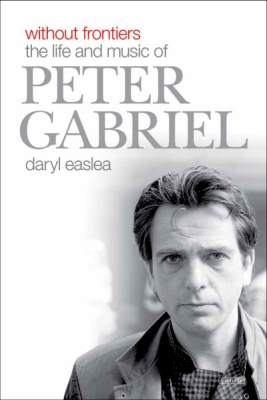| |
Taken from WEBSITE (September 19, 2014)
'Without Frontiers: The Life and Music of Peter Gabriel' by Daryl Easlea
Book Review
by Chris Klimek

Manu Kache, Peter Gabriel, David Sancious and David Rhodes
perform at the Patriot Center in Fairfax, VA as part of Gabriel's
Back To Front Tour, celebrating the 25th anniversary of his
landmark album, So. (Kyle Gustafson/FOR THE WASHINGTON POST) |
In 1986 Peter Gabriel released “So,” the biggest hit of the oft-inscrutable English art-rocker’s now-47-year career. The album’s deluxe 2012 reissue includes primitive versions of each of its nine songs: “Sledgehammer” was the single that went to No 1 in the United States, but “Big Time,” “Don’t Give Up” and the ballad “In Your Eyes” — immortalized when John Cusack played it from a boombox held over his head in Cameron Crowe’s anxious-youth romantic comedy “Say Anything” — were all chart-climbers, too. Padding reissue collections with demos and ephemera is standard procedure for enticing diehards to re-purchase albums they already own, but that “So” bonus disc is still unique: Each track is a smartly edited mash-up of several successive iterations of the song, starting with a skeletal piano melody or vocal chant or rhythm track, then layering on elements until, after a few minutes’ productive noodling, a beloved Thatcher-era pop tune has emerged.
To say that hearing those works-in-progress tracks offers more insight into Gabriel’s working methods than does Daryl Easlea’s 400-page biography “Without Frontiers” would be unfair, but not wrong. Easlea doesn’t pretend he’s evaluating Gabriel’s career dispassionately: “To call him simply a pop star would be to call Salvador Dali a mere painter,” Easlea gushes, and that’s just the introduction. “Gabriel is one of the most talented, enigmatic artists that Great Britain has ever produced,” he goes on, canonizing the composer of “Moribund the Burgermeister” right up there with Shakespeare and Adele .
That’s a claim with a grandiloquence worthy of Gabriel himself. And yet Easlea makes a credible case for at least the first part of it: He airs Gabriel’s frustrations with the artistic confines of rock stardom even in a band as weird as Genesis, the outfit he fronted and that went on to greater fortune after he quit in 1975. He documents Gabriel’s subsequent side careers as one of the founders of the world-music-oriented WOMAD festival and Real World record label, as an investor in tech start-ups, and as a pioneer of multimedia stage shows — most notably, the site-specific installation he was commissioned by the British government to create for the 2000 opening of the wildly expensive Millennium Dome. Gabriel also tried for decades, without success, to open a sort of egghead Disneyland to be called the Real World Experience Park. (It sounds like a joke, but it isn’t.) This panoply of interests, plus his abiding perfectionism, helps explain the slowed pace of his record-releasing after “So.”
Easlea writes with the combination of urgency and ease unique to a superfan with a ready defense for every era of his hero’s output, from the pompous prog rock of Genesis, to his fling with MTV stardom, to the orchestral reinvention — sans guitar or drums — of his back catalogue that has occupied him in recent years. Curiously, Easlea seems to believe Gabriel to be a funny man with a great sense of humor, even as the book he’s written reinforces Gabriel’s image as intellectual and deliberate and a bit of a bore.
Though the author seems to have had at least one meeting with Gabriel, the quotations from his primary subject are all secondhand. But he’s interviewed enough former managers, producers, arrangers and session musicians to have chiseled out a compelling likeness of a demonstrably curious and apparently generous visionary — one who never let a budget or a deadline interfere with his pursuit of an inspiring idea.

"Without Frontiers: The Life and Music of
Peter Gabriel" by Daryl Easlea (Overlook/Overlook) |
Klimek is a freelance writer based in Washington.
WITHOUT FRONTIERS
The Life and Music of Peter Gabriel
by Daryl Easlea
Omnibus. 416 pp. $34.95
|
|